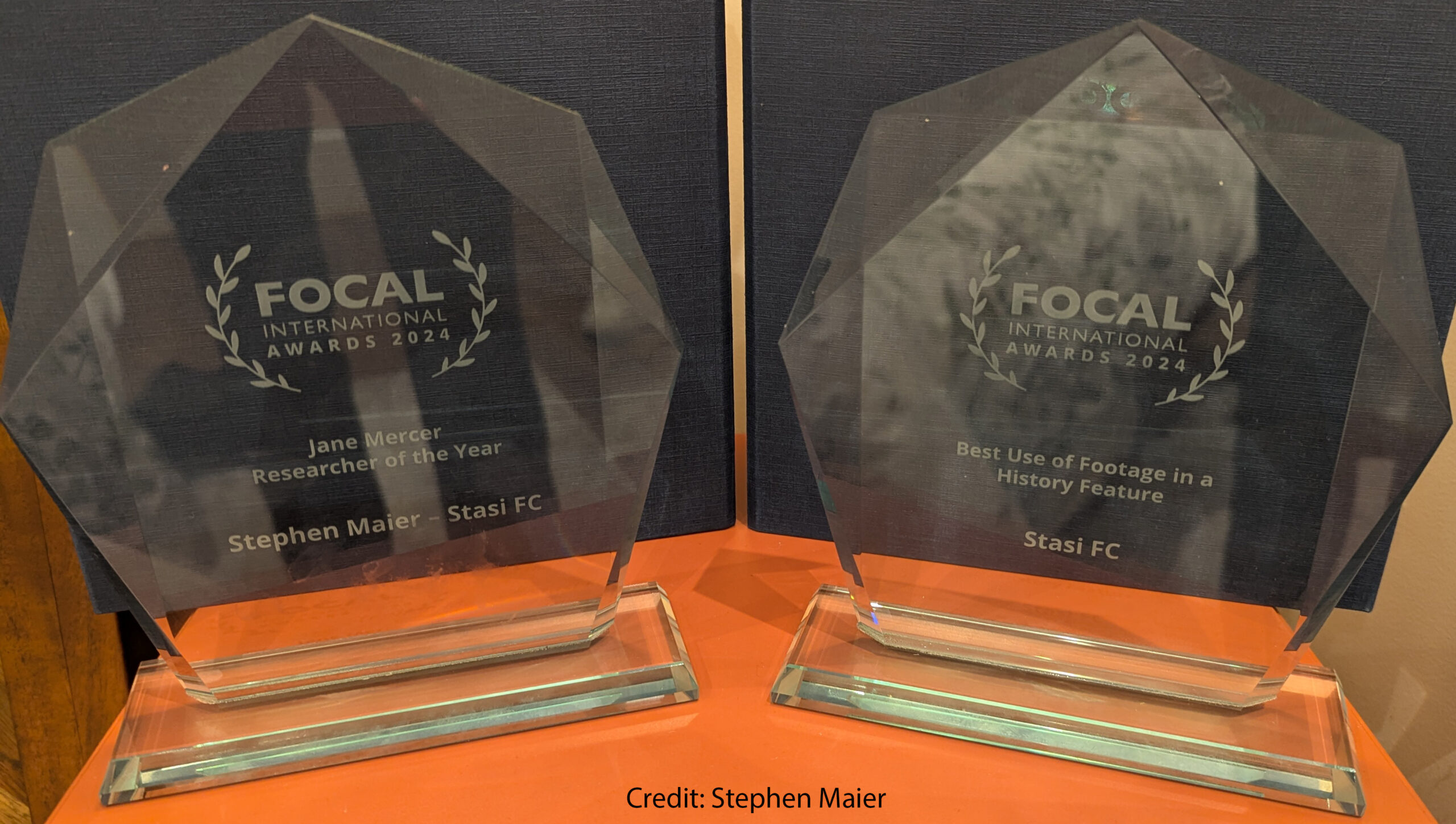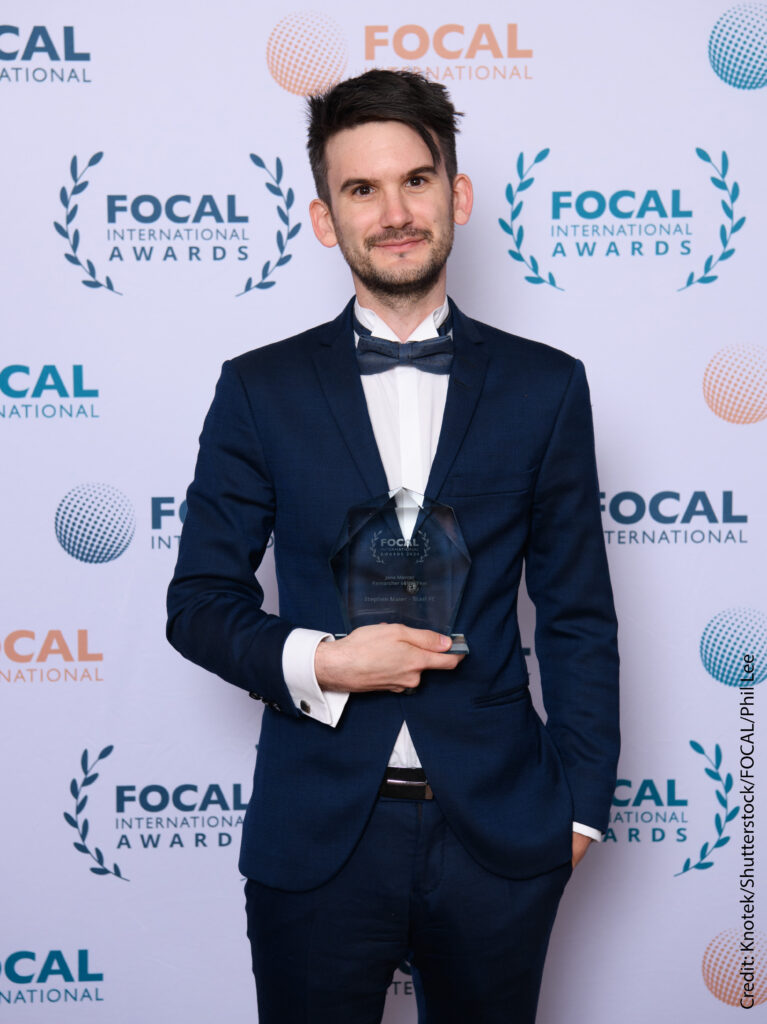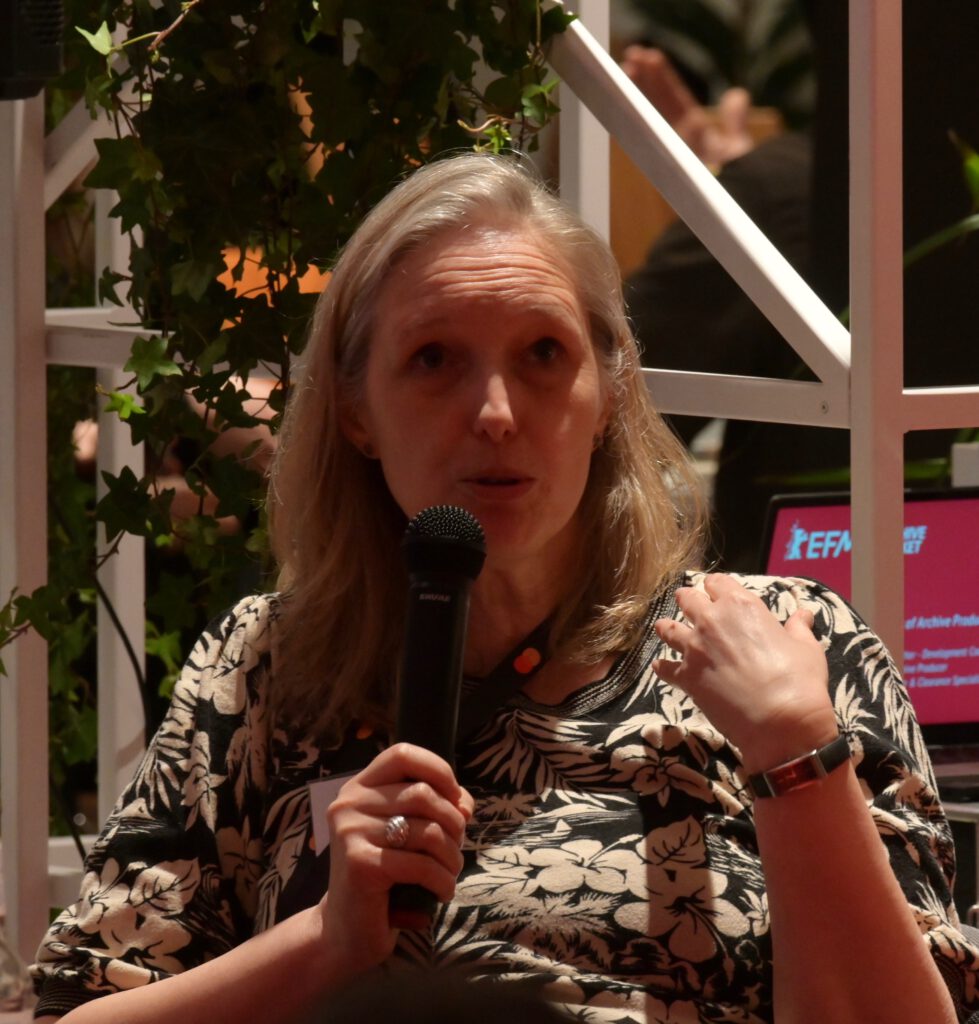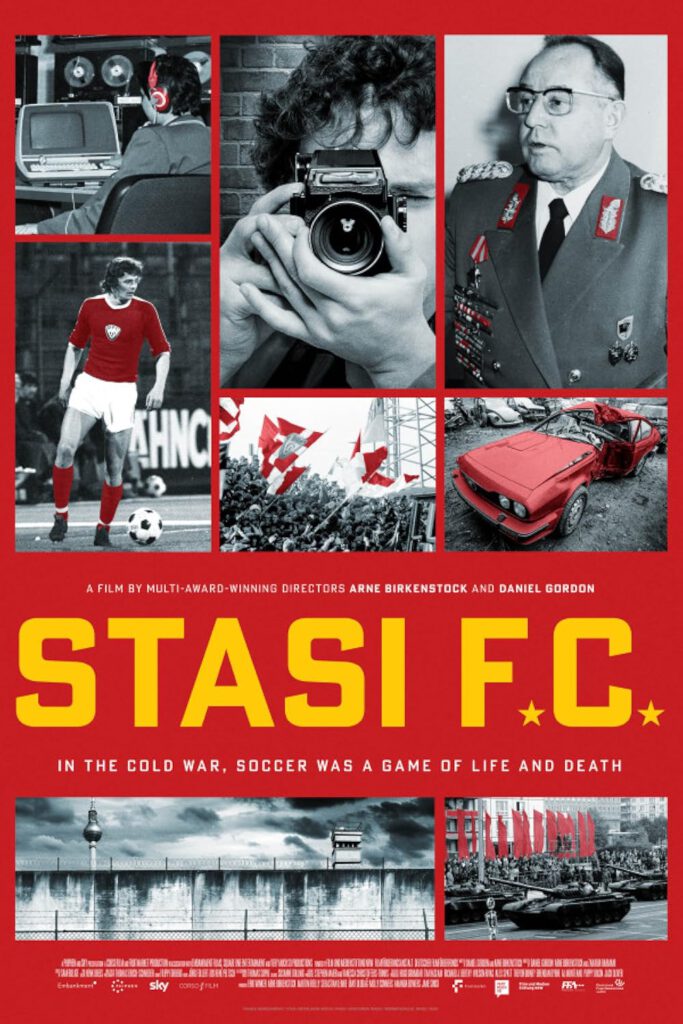
30 Jun Interview with the winners of the FOCAL Award 2024 about their film “Stasi FC”
GRAP members Vanessa Christoffers-Trinks and Stephen Maier have won two awards for the documentary “Stasi FC” at the FOCAL International Awards 2024: Stephen received the “Jane Mercer Researcher of the Year Award” and together they were honoured in the category “Best Use of Footage in a History Feature”.
FOCAL International (Federation of Commercial Audiovisual Libraries)
is a professional association representing archives and archive producers in over 30 countries.
Congratulations to you both on winning the FOCAL Award 2024!
Stephen, you were at the award ceremony in London. How did you experience the evening?

Stephen: The awards evening was very prestigious and wonderfully organised by FOCAL. This year, the event was held at Church House Westminster, a very special and historic venue. During the Second World War, the British Parliament met here under Churchill. With so much history and red carpet moments, I quickly realised that this evening would stay with me for a long time.
The award ceremony was hosted with great humour by British comedian Lucy Porter. There were also plenty of opportunities to chat to old contacts and make new acquaintances that evening. Rarely has the entire archive community been so concentrated in one place.
Being allowed to take to the stage twice as the winner really surprised me, so I was a little nervous. I’m not used to so much limelight. I had only prepared a speech once, just in case. However, I was told that I gave my two acceptance speeches with a reasonable degree of confidence. I am very happy and grateful for the personal award for best researcher and the prize for the production.
What does the FOCAL Award mean to you?
Vanessa: The FOCAL Award is the only award that recognises our work. That’s why this award is very important for us and a recognition of our profession and our work, which is of fundamental importance for an archive-heavy documentary film like “Stasi FC” Many people, even in the film industry, still don’t realise how much work goes into archive research and rights clearance So it’s nice to be rewarded for all the energy you put into it.
Stephen I see it the same way As archive producers, we are rarely in the limelight and this is where we get to shine for once FOCAL does a lot for the archive community, both as a mouthpiece for the archives and for the archive producers and researchers. The award ceremony brings everyone together for an evening In addition to an enjoyable evening, the personal dialogue between colleagues is very important to me.

Let’s talk about the film “Stasi FC”. The documentary tells the story of how GDR football was controlled by the State Security. There are stories of betrayal, murder, escape and manipulation. How did you get involved in the production, what roles did you take on?
Stephen: I worked on the project in phases for almost three years. The director and producer Arne Birkenstock had been put in touch with me by a colleague. As I already had expertise with the Stasi topic and was well versed in GDR sources, I quickly became part of the team. The content concept of the documentation was initially very open-ended and so I was able to contribute to the development of the project with the archive material I had researched. For example, I looked through a lot of Stasi files that are not shown in the film, but nevertheless became part of the story. Archive material can thus tell the story and drive it forward rather than being used purely for illustrative and evidential purposes, as is often the case. I enjoy working on these archive-driven documentaries the most.
Vanessa: I only joined the project later, when the editing was already quite advanced. But it was still being rearranged and details had to be researched. My main task was to negotiate with the archives and broadcasters in order to squeeze everything into a given budget. As well as the whole final process including ordering the master material.
What attracted you to the topic of the documentary?
Vanessa: I find the topic of GDR history very exciting and I’m also a football fan. That’s why I really like this connection. I also didn’t realise how much the Stasi controlled GDR football.
Stephen: Unlike Vanessa, I’m not necessarily the biggest football enthusiast. But as an archive producer, you always get to know and appreciate new topics. That’s the exciting thing about our job. You learn something new every day through the archive material you research, as you always have to understand the context.
Were there any unusual or new sources that you found and used during production?
Stephen: The most important source was the German Broadcasting Archive in Babelsberg, where the GDR TV heritage is kept. I had the privilege of spending several days there viewing tapes of the football coverage of the time. On one day I was even accompanied by the director and editor. This gave us a feel for the archive material and what was possible with it early on in the production process. Because I sifted through entire tapes and not just individual, digitised clips in an archive database, I was also able to find footage that we wouldn’t otherwise have discovered.
Another important source was the Stasi archive. There are some well-known films from the Ministry for State Security, but we also obtained unknown recordings using text-based archive lists. The research in the authority’s photo department was also exciting. It’s quite something to work your way through boxes full of surveillance photos with white archive gloves and call out signatures of photos you want to digitise to the archivist.
We would not have found an important ZDF report from the 1980s if the Stasi had not made recordings of West German television at the time. An interesting report about the two footballers and GDR refugees Falko Götz and Dirk Schlegel was not indexed well enough in the ZDF archive. But because I had the report from the Stasi recording, the ZDF archive was able to locate it after all.

What was your biggest challenge in this production?
Vanessa: For me, the biggest challenge was sticking to the budget. At times it wasn’t clear whether it wouldn’t blow up in our faces! We had to use a lot of negotiating skills to keep it more or less within the green zone. Football rights are of course a challenge in themselves!
Stephen: As we were still very open-minded about the content concept at the beginning, I provided countless hours of archive material for the production. It’s important to keep an overview here and well-managed archive lists are the be-all and end-all. I was able to perfect my work with lists during the project.
How was the collaboration with the director and the editor? Did you have precise guidelines or were you able to research very freely?
Stephen: As I already mentioned, we were very open-ended at the beginning and I was very free in my research. You usually agree a list of desired motifs with the director at the beginning and then you find additional material outside of that. The trick is not to lose the common thread during the research, but still to recognise potential treasures that were not initially desired. You can discuss these finds with the creative team and perhaps they will find their way into the film.
When working with archive material, however, it’s usually not just archive producers, editors and directors who are involved. Especially in this project, where I delivered countless hours of material to the production, an assistant position for the archive material was very important. Paul Ulmer was the interface between me and the editing team. He sifted through all the material in detail and categorised it so that the editing team could find their way around. Post-production also plays an important role when working with archive material. It is the technical interface and ensures a smooth process for the provision of materials and much more.
Furthermore, the people who work for film archives and film and photo agencies should not go unmentioned. For this project in particular, I must emphasise the support of RBB Media. It is responsible for licensing the GDR TV heritage from the German Broadcasting Archive. An employee of RBB Media did a preliminary search based on my motif requests and selected relevant tapes, which I was then able to view in Babelsberg. But even this work would not have been possible if archivists had not first painstakingly sifted through and indexed materials. As a result, there were sometimes very detailed lists of 30-year-old football matches from the GDR Oberliga with details of players, goals, fouls and other match actions. That was very valuable for my research.
Do you have a personal favourite moment in the film?
Vanessa: I find the whole story about Lutz Eigendorf very exciting. As he is no longer alive, his story had to be told mainly through the archive, combined with the newly filmed interviews with former players, who also talk about Eigendorf. I think that was very successful.
Stephen: There’s a goosebump moment that can also be seen in the trailer. Lutz Eigendorf, who fled to West Germany, is asked on a talk show how his football career in the West has gone so far. He replies “Toi toi toi – I think it’s going quite well so far”, making the gesture for “knocking on wood”. A short time later, he is dead. Presumably murdered by the Stasi.
There is often only one archive producer per production. What advantages do you see in teamwork?
Vanessa: I’m a big fan of teamwork in archive producing, especially for such large projects. We all have different experiences and expertise that we can bring together well as a team. Sometimes you get stuck somewhere and can’t move forward, so it’s an advantage if you can exchange ideas or brainstorm with someone. Illness and holidays can also be better organised and absorbed in this way. If you are unavailable (also because another project comes up, for example), the other person can step in.
Stephen: Productions sometimes underestimate the time required in the hot phases of a project, such as picture lock. Negotiations have to be conducted, licence agreements checked and signed and the provision of the master material coordinated all at the same time and in a short space of time. The whole thing usually involves a large number of rights holders. That’s an incredible amount of communication with everyone involved.
Research and rights clearance in advance can also be very time-consuming. It often happens that you have to spend several working days to clear the rights to just one film clip or photo because it is very important for the project. For this reason, producers also benefit from a team of archive producers, as this makes the handling of a project run more smoothly under time pressure. Especially for series with several episodes and a lot of archive material, I would only work in a team. Anything else would be negligent.
Where can you currently watch the film “Stasi FC” in Germany and internationally?
Vanessa: Internationally, the documentary has so far been shown on Sky UK and is available on streaming services in the UK. A separate cinema version is currently being produced for Germany, tailored to German audiences. There is no exact start date yet, but it is expected to be in spring 2025.



